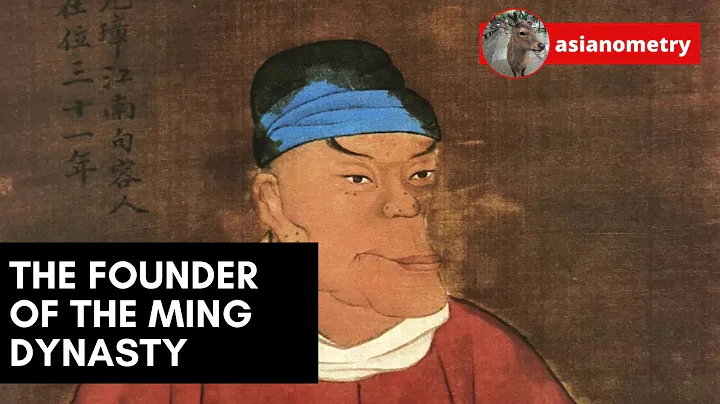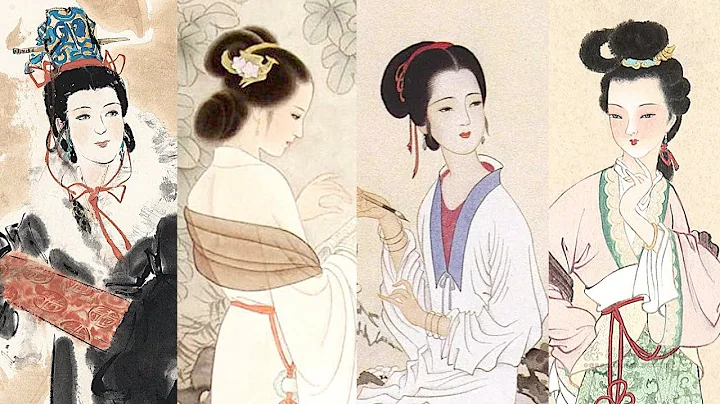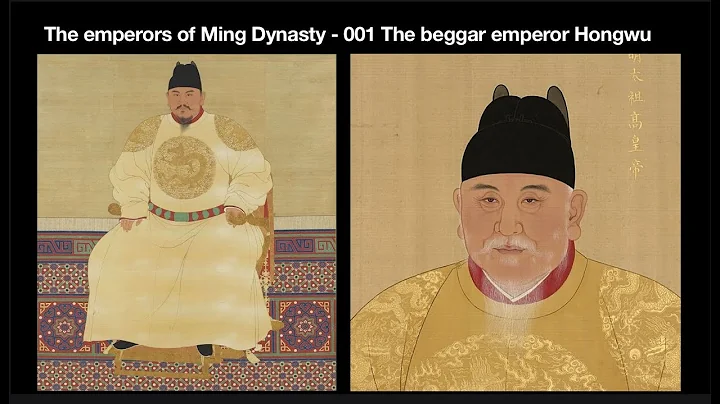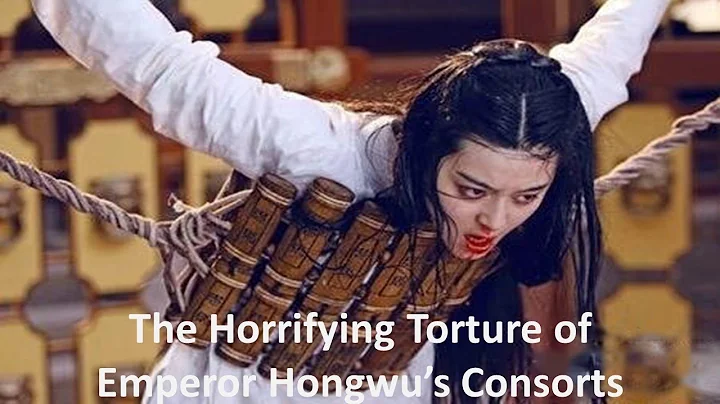When talking about Zhu Yuanzhang, we must talk about the four major Hongwu cases, namely the Kongyin case, the Hu Weiyong case, the Guo Huan case, and the Lanyu case. These four major cases all revealed Zhu Yuanzhang's outstanding imperial mentality, which can be seen through the three most important characteristics - short interval, wide range of influence, and strong directivity.

The empty seal case in the ninth year of Hongwu (1376) or The fifteenth year of Hongwu (1382) mainly targeted local officials; the Hu Weiyong case in the thirteenth year of Hongwu (1380) targeted civil servants; the case in the eighteenth year of Hongwu (1385) The Guo Huan case targeted high-ranking officials in the capital; the Lan Yu case in the 26th year of Hongwu (1393) targeted military generals. Such a precise, rapid and targeted attack is not so much Zhu Yuanzhang's punishment of corruption, but the perfect use of the emperor's mind to protect the Zhu family.
Let’s first talk about the blank seal cases in the ninth year of Hongwu (1376) or the fifteenth year of Hongwu (1382). What is
empty printing? As the name suggests, you stamp the form first and then fill it out. According to regulations, local officials across the country must submit tax accounts to the Ministry of Revenue every year. The local and central accounts must be completely consistent and accurate. If one item does not match, the entire account book will be re-reported. However, what is handed over is grain, which will be lost during transportation. It is a high probability that the account books of both parties will not match the actual goods. In addition, because officials from the southwest, northwest, and southeast came to Beijing (Nanjing) with inconvenient transportation, and the journey was long and arduous, the officials of the Ministry of Household Affairs were anxious to close the project. If they were sent back to rebuild, it would be delayed. Therefore, this kind of unspoken officialdom rule appeared in the Yuan Dynasty. Officials would prepare a blank book with the seal in advance for reprinting in Beijing.
But Zhu Yuanzhang didn't know this hidden rule. When he found out, he was even more furious. He thought it was a serious crime of officials colluding with each other and deceiving the emperor. He immediately ordered the chief seal official to be executed, and his deputy was sent to a distant place with a hundred sticks.
Professor Bai Hua once made this conclusion in the book "Zhu Yuanzhang and the Kongyin Case": "The number of people involved in the Kongyin Case should be more than a thousand. According to the official system at that time, the total number of officials was about 20,000, and a thousand people were punished, accounting for 5% of the total number of officials is enough to cause a sensation. "

The empty seal case seemed to be Zhu Yuanzhang's attempt to rectify the power of officials. Many later generations even regarded it as an unjust case and scolded Zhu Yuanzhang for disregarding human life. However, Zhu Yuanzhang, who made his fortune in a reckless period, knew that. This is an official relying on the power in his hands to prey on the people and make money through corruption. He once overthrew the corrupt court with his own hands, how could he tolerate this phenomenon happening again in his empire?
The next step is the case of Hu Weiyong in the thirteenth year of Hongwu (1380).
In the sixth year of Hongwu (1373), Hu Weiyong, an important member of the Huaixi clique, that is, the civil servant clique, served as the right prime minister. During his seven-year term as prime minister, he formed cliques in the court for personal gain and excluded dissidents. The most typical ones are and Liu Ji. Because he once said to Zhu Yuanzhang that Hu Weiyong was not suitable for prime ministership, he was hated and fired. But Hu Weiyong persisted in his pursuit. In the eighth year of Hongwu (1375), Liu Ji fell ill. He sent an imperial physician to visit him. Liu Ji died soon after taking the medicine and returned to the west.
Later, in the twelfth year of Hongwu (1376), when the imperial capital paid tribute, Hu Weiyong concealed the report and failed to report it, and passed the blame to the Ministry of Rites, which made Zhu Yuanzhang deeply feel that the imperial power was neglected and the prime minister was in dictatorship. Soon, in the first month of the 13th year of Hongwu (1380), Zhu Yuanzhang ordered the execution of Prime Minister Hu Weiyong on the charge of plotting rebellion and implicated the nine tribes. This was the beginning of the Hu Weiyong case, which lasted for 12 years and affected the people. More than 30,000 people were executed, and it did not end until the 25th year of Hongwu (1392).

On the surface, the Hu Weiyong case was a political incident for Zhu Yuanzhang to strengthen his monarchy. If you study it carefully, you will find that this case is just an excuse to reset the administrative system, remove the Prime Minister and abolish the Zhongshu Province, and monopolize all the affairs of the country to the emperor. , pave the way for his own ambitions, and also protect the Zhu family.
The next step is Guo Huan in the eighteenth year of Hongwu (1385).
In March of the eighteenth year of Hongwu (1385), Guo Huan, the minister of household affairs, and others were accused of stealing and selling official grain. So Zhu Yuanzhang ordered an investigation and found that Guo Huan, the minister of household affairs, and others had embezzled more than 24 million shi of grain in total. Later, it was discovered that twelve of the thirteen chief secretaries in the country, five of the six and were involved, and the amount involved was getting larger and larger.
Because when Zhu Yuanzhang was a commoner, his parents and brother all starved to death within half a month due to lack of food. After this experience, corruption will naturally not be lenient. All the officials of the five ministries involved in the case were executed. In order to recover the stolen goods, many wealthy grain merchants and landlords were also raided. As a result, the landlords became resentful of the imperial court and out of resentment for the common people, they executed the interrogator Wu Yong and others.
The history of the Ming Dynasty records that "from the left and right ministers of the six ministries and below, 7 million were stolen, and officials in the province were directly connected, and tens of thousands of people were killed."

The Guo Huan case cannot simply be seen as Zhu Yuanzhang's rectification of corruption in the imperial court; He reshuffled and took control of grassroots farmland and government.
The last one is the Lan Jade case in the twenty-sixth year of Hongwu (1393).
We first need to understand Prince Zhu Biao at this time Zhu Yuanzhang has always had high hopes for him since he was born. During his 27-year career as prince, Zhu Yuanzhang never thought about replacing him. Not only did he teach him carefully, but he also invited famous Confucian scholars. Be a teacher. Zhu Biao was not as hot-tempered as Zhu Yuanzhang, but he was gentle and elegant, without dandy habits, and was very respectful to ministers and teachers. In contrast to Zhu Yuanzhang's cruel and severe political methods, one can imagine the degree of support Zhu Biao had in the court.

The protagonist of this case, Lan Yu, was also loyal to Zhu Biao, so Zhu Yuanzhang wanted to save his life. As a member of the prince's martial arts group, he prepared to clear Beiyuan after Zhu Biao inherited the throne. Unfortunately, things did not go as planned. Zhu Biao passed away in the 25th year of Hongwu (1392) and walked ahead of Zhu Yuanzhang. The young emperor and grandson he left behind could not suppress the powerful and domineering Lan Yu. Therefore, in the second year, Zhu Yuanzhang used Lan Yu to rebel and began to massacre Prince Zhu Biao's martial arts group. The first was Lan Yu, thinking that it was his children's relatives who treated him leniently: they were chopped into pieces and skinned instead. Later, more than 15,000 generals and clan members were killed.
The Sapphire Case appears to be Zhu Yuanzhang's purge of the founding ministers, but is actually the result of one emperor and one courtier. Prince Zhu Biao died unexpectedly and prematurely, so he could only reshuffle the cards to make plans for his young emperor's grandson.

Under Zhu Yuanzhang's superb imperial skills, although he has gone through several killings, it has made the new Ming Dynasty more stable. Even Emperor Kangxi praised Zhu Yuanzhang: "Ming Taizu was gifted with wisdom and bravery. He rose to prominence as a commoner and developed martial arts scriptures to unify Fang Xia. All his systems are based on the present and the ancients. They are extremely comprehensive and cannot be surpassed except by descendants. That is to say, the emperors of Han, Tang and Song Dynasties are sincere." It’s not as good as ”
.




















